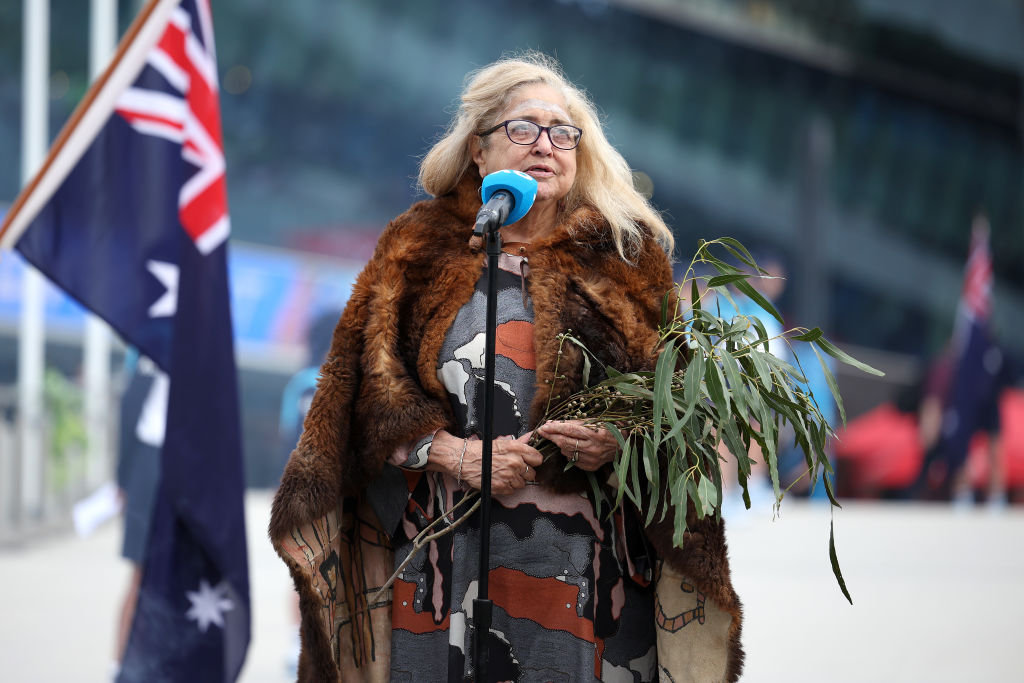If you attend almost any public meeting or event in Australia these days, you’ll be greeted – some would say confronted – by a mandatory statement before it starts. Even the nation’s parliament now starts the day with this statement, ahead of the centuries-old ritual of reciting the Lord’s Prayer.
Known as the Acknowledgment of Country, it is a now all-pervasive ritual of Australian life. Generally, it uses these words:
A whole industry has sprung up around Aborigines being hired by event organisers to stage Welcomes to Country
We meet here today on the lands of the traditional owners, the (Aboriginal tribe) people, and acknowledge their elders past and present.
The more zealous add ‘and emerging’ to the end, addressing Aboriginal children and the unborn as well as genuine elders. ‘Country’ refers not to the Australian nation or a state, but to the ancestral tribal lands of the locality.
It’s not just parliament and major public and sporting events rendering homage to local Aboriginal elders. My five-year-old is about to start school, and a recent Zoom parents’ meeting to explain mundane school routines, requisites and uniforms was prefaced by the headmistress – obligated by protocols imposed by Victoria’s radical-left state government – making an Acknowledgement of Country.
And if you go to a conference Down Under, be warned: there’s not just a single acknowledgement at the start of proceedings. Every single speaker feels compelled to do their own, and woe betide anyone who dares joke about or parodies the sacred words, say by acknowledging their bank manager as the traditional owner of their mortgaged home.
This practice became fashionable around the turn of the century, following the Mabo decision of Australia’s High Court that overturned the legal assumption that Australia was unsettled – terra nullius – before European settlement, substituting a concept of original native title over Australian land. White progressives embraced it, eager to show their acceptance of native title and prior Aboriginal ownership. That element of Australian society, dominant in politics, higher education, the media and the arts, soon spread its gospel to public institutions and corporate Australia.
Indeed, a whole industry has sprung up around Aborigines being hired by event organisers to stage Welcomes to Country. One or more Aboriginal performers or tribal leaders are paid to conduct mysterious rituals known as ‘smoking ceremonies’ involving chanting, dancing, burning leaves to smoke out evil spirits and, often, mini-sermons from the stage – rituals so ancient they allegedly date back to an improvisation by two Aborigines in 1970s. In the spirit of the age-old aphorism of capitalism that a fool and his money are soon parted, no wonder entrepreneurial Aboriginal organisations and performers have turned this into a very lucrative line of business.
Furthermore, rending homage to Aboriginal and Torres Strait peoples has led to progressive activists questioning all manner of Australian symbols. Aboriginal and Torres Strait Islander flags are everywhere on both public and commercial buildings alongside the national ensign. Even current symbols are disowned by their official custodians, as witnessed this month when the Lord Mayor of Sydney, a with-it progressive woman named Clover Moore, had her staff raid the room of another Sydney alderman and confiscate the current city flag, which Moore deems ‘problematic’ because it contains no Aboriginal motifs or symbolism, after the alderman had it in the background of an online meeting.
For political progressives and cultural luvvies, these things matter a great deal and, as Moore showed, even absurdly so. For most other Australians, likely including many Aborigines who aren’t part of their people’s activist elite, these public manifestations of quasi-medieval fealty are over-the-top and overbearing. Certainly, Welcome to Country treats non-Aboriginal Aussies effectively as foreigners in their own land, even though they make up all but 3 per cent of the population. Increasingly it is resented as dividing, rather than uniting, Australians in the Aboriginal cause.
The nature of public debate around last year’s contentious and divisive referendum to entrench an Aboriginal ‘Voice’ to parliament in the nation’s constitution showed that almost all Australians wanted to do the right thing by their Aboriginal fellow countrymen in terms of acknowledging their status as Australia’s original inhabitants, especially in terms of alleviating endemic Aboriginal social and economic disadvantage. The referendum’s resounding defeat, however, also showed that identity politics placing a small segment of the wider population on a pedestal was not seen as appropriate, or even wise, by the great majority of those same Australians.
When it comes to welcomes to, and acknowledgments of, ‘country’, there are hints that some are starting to push back against the incessant and in-your-face virtual signalling. Since the referendum’s failure last October, some local councils have moved to scrap mandatory Acknowledgements of Country in their meetings, albeit to condemnation and ridicule by the Australian progressive media and commentariat. Such developments may be small but they are a sign that morally smug progressive politicians and opinion leaders have gone too far.
Not that they see it. Last April, firebrand Aboriginal leader and activist university professor Marcia Langton, declared that if the Voice referendum failed there would be no more Welcomes to Country. ‘How are they ever going to be able to ask me to come and speak at their conference?’ she said.
‘If they have the temerity to do it, of course the answer is going to be no.’
Langton clearly sees Welcome to Country as a privilege to be bestowed upon grateful trespassers on her people’s land. She would, presumably, be appalled to know that a great many Australians now want to take her at her word, and be left alone.






Comments